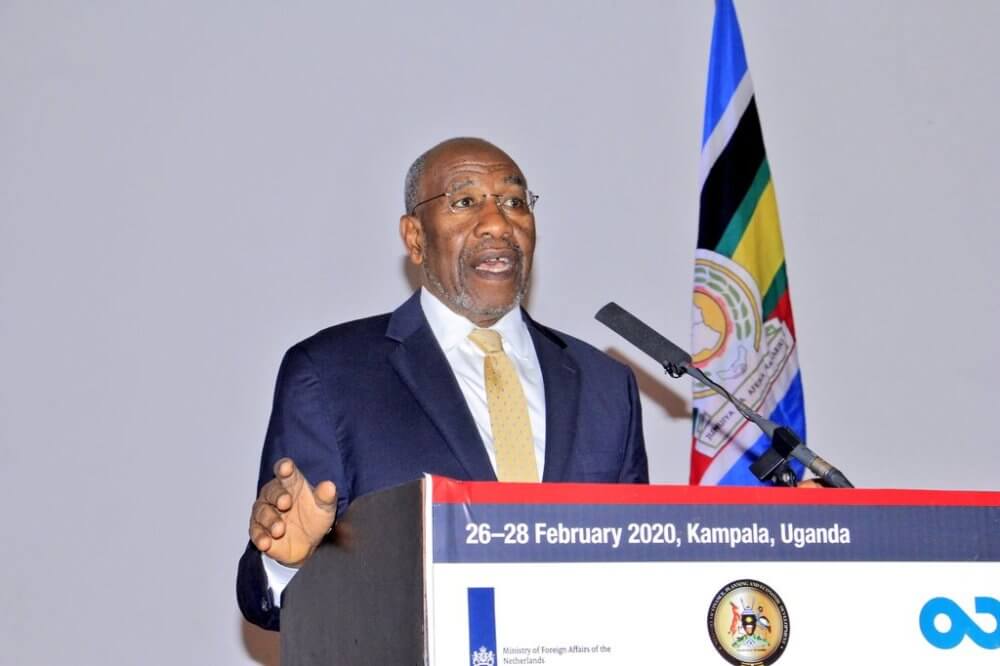
Our Projects are
Transforming African Trade
Quick Contacts
2nd Floor, Fidelity Insurance Centre Waiyaki Way, Westlands


26-28 February 2020, Kampala, Uganda
Opening Remarks by Rt. Hon. Ruhakana Rugunda Prime Minister and Leader of Government Business
26th February 2020
Honourable Ministers,
Permanent Secretaries and Secretaries of the Treasury,
Permanent Secretary of the Ministry of Foreign Affairs of the Netherlands,
The Dutch Ambassador,
Distinguished Guests,
Ladies and Gentlemen
The Government of Uganda is honoured to be hosting this regional conference on public debt management and sustainable economic growth in Sub-Saharan Africa.
I am pleased to welcome you to the Republic of Uganda and to this conference that has brought together high-level policymakers and practitioners of debt management, academic experts and civil society representatives.
Special thank you goes to the Dutch Government and specifically to the Ministry of Foreign Affairs along with the United Nations Department for Economic and Social Affairs for the support rendered to the government of Uganda in preparing this conference.
This conference is timely. As I speak almost 40% of countries in Sub-Saharan Africa are in debt distress or have a high risk of it. The IMF’s records show the average level of total debt for Sub-Saharan African countries had risen to 55% of GDP in 2016 compared to 35% in the early 2010s. Debt in itself may not be a problem if it is incurred for development reasons and at affordable costs.
The reason for the rising debt burden can be attributed to an increasing level of investment requirements. In order to improve productivity and growth, countries need to invest in infrastructure. Thus bringing future wealth forward. Debt has been instrumental in addressing infrastructure gaps of the past and has contributed to achievements in human and social capital development. Therefore, it has helped us achieve our development goals and finance our development agendas.
Countries, where peace and stability are flourishing, are attractive places to lend to. As countries move away from conflict, they may also experience more borrowing options. Some of those who lend to the region may even consider it a contribution to peace. There is an argument that a country facing fiscal challenges is more likely to be politically unstable. So access to credit can contribute to stability.
Furthermore, following the financial crisis of the late 2000s, there has been relatively accessible money in the global economy that is searching for a return. As growth stagnated and even declined in other parts of the world, those looking to make a return on their capital have looked towards Africa.
Debt management is not just about risks and challenges. It is also about opportunities. We need to ensure that the debt we acquire is well utilised and contributes to sustainable and inclusive economic growth. This requires prudent economic policies alongside capable project management.
Debt challenges and opportunities should be tackled as a region. Many of us face similar situations and dynamics. Beyond that though we are intrinsically linked. Our economic growth depends on that of our neighbours and trading partners and vice versa. We hope they manage their debt well as they also hope we do. Increasing regional integration means this collaboration is ever more important.
Through sustainable and inclusive economic growth, we can outgrow our debt burdens and reduce our reliance on borrowing, and particularly unfavourable financing options. This calls for devising collaborative ways of addressing the slow growth rate of exports and GDP. This can be achieved by vigorously pursuing the improvement of our domestic revenue mobilisation strategies.
Furthermore, even at the micro or project level, partnerships are important. As a region, in order to boost internal and intraregional trade and promote the desired growth, there is need to close the existing infrastructure gap to promote industrialisation through collaborative efforts.
Debt and financial managers along with the academia and civil society, I call on you to effectively utilise your expertise use to pursue the implementation of the Programme for Infrastructure Development in Africa (PIDA) formulated by the African Union Commission, United Nations Economic Commission for Africa (UNECA), African Development Bank and New Partnership for African Development (NEPAD).
By enhancing the improvement of the road infrastructure and border crossings like is being done by TradeMark Africa; optimising the use of the surplus energy resources across the continent to create regional electric power pools just like the Southern Africa Power Pool (SAPP); and addressing the existing challenges in the electricity transmission infrastructure. The debt directed to such interventions will go a long way in providing the economic growth we aspire for and create self-sustenance within the region.
This workshop should, therefore, provide an opportunity for us to create a mechanism to enable the region to maximise the existing synergies to create collaborative negotiation power to abate the debt crisis.
I, therefore, look forward to the outcomes of your deliberations providing ideas on to achieve the proposed collaborative mechanism for us to effectively manage our debt.
Before I finish, I must just touch one more subject. I do hope that many of you take the opportunity to explore our beautiful and welcoming country that Winston Churchill once described as the ‘Pearl of Africa’. We are home to Africa’s tallest mountain range, the Rwenzoris, the source of the world’s longest river, the Nile, and the continent’s largest lake, Lake Victoria.
In our national parks, you can trek with mountain gorillas, golden monkeys, or our closest relative, the chimpanzee. You can see the big five on safari or a boat cruise. We are the only country with lions that sleep in trees and we have over one thousand species of birds.
On behalf of the Government of Uganda, I would like to wish you fruitful deliberations and declare the Regional Conference on Public Debt Management officially open.
Disclaimer: The views and opinions expressed in this article are those of the authors and do not necessarily reflect the official policy or position of TradeMark Africa.